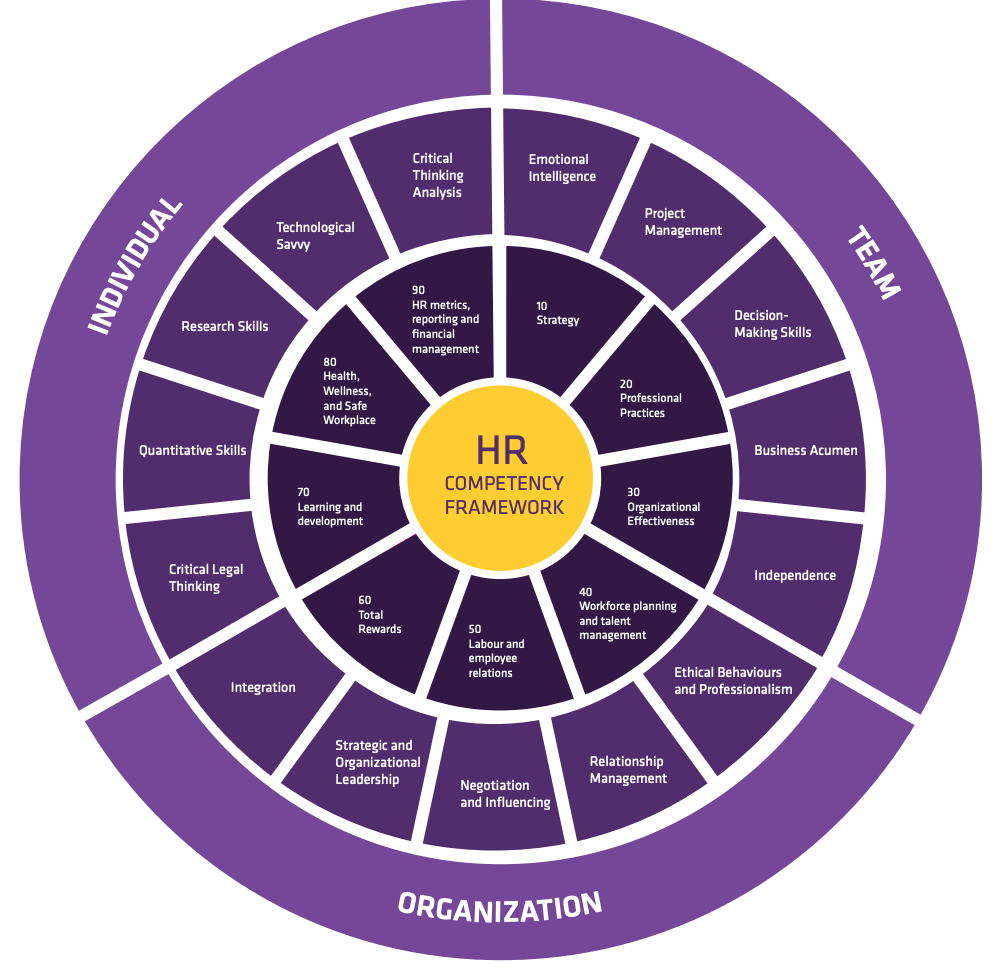Skills Needed for HRM
HRM is a specialized area, much like accounting, marketing or finance. In this section, for our Ontario students, we borrow extensively from the material produced by The Human Resources Professionals Association (HRPA), the professional association that governs HR professionals in Ontario. Later in the section, we will discuss the HRPA in more depth, but first, we explore the competencies that are important to have for an HR professional, as defined by the HRPA .
Competency Framework
The diagram below illustrates the functional areas and enabling competencies in the HRPA Human Resources Professional Competency Framework. The numbering of the functional areas below corresponds to that used in the text that follows.

HR Competencies
The HRPA proposes a number of core competencies for the HR professional. The competencies are categorized as either functional or enabling competencies.
Functional Competencies:
Click on each of the competencies below to learn more.
Enabling Competencies
The HRPA proposes fifteen enabling competences. Enabling competencies reflect the key elements that comprise the personal attributes of a human resource professional. the HRPA enabling competencies are described below.
Click on each competency to learn more.
The HR Professional: The HRPA
As mentioned at the beginning of this section, HR has the particularity of being governed by a professional body and legislation in the Province of Ontario the Human Resource Professionals Association (HRPA).
The primary purpose of the HRPA is to promote and protect the public interest by governing and regulating the practice of members, students and firms registered with the Association in accordance with the Registered Human Resources Professionals Act, 2013.
The HRPA’s governing and regulatory role not only ensures a competent & ethical HR practice, but works to advance the profile & value of the HR profession amongst members, students and organizations.
The HRPA maintains three (3) designations; Certified Human Resources Professional (CHRP), Certified Human Resources Leader (CHRL) and Certified Human Resources Executive (CHRE). HRPA designations were created to signal to organizations that an individual has the knowledge and expertise they need to excel in the HR profession.
The benefits of achieving a designation for HR professionals are numerous. In addition to demonstrating the abilities of the HR professional, certification allows HR professionals to be more marketable in a very competitive field.
How to get one’s career going as an HR student?
Students who are interested in a career in HR may wish to complete the HRPA’s certification process confers the right to use the title Certified Human Resources Professional and the right to use the initials C.H.R.P. or CHRP after one’s name. Certification is a “warrant of competence” or “warrant of expertise”. The overarching objective of HRPA’s certification process is to ensure that those HR professionals who are certified by HRPA possess the knowledge and skills in sufficient degree to competently perform important occupational activities and to protect the public interest.
Certification establishes common professional standards for Human Resources Management across Canada. Employers value such standards which seek, among other things, to address multi-jurisdictional considerations and facilitate the efficient practice of human resources. The CHRP designation positions the practitioner at the leading edge of the profession in Canada – informed, experienced, connected and committed to career long learning.
Certification Requirements
The following has been copied from HRPA’s website. For up-to-date information and assistance contact HRPA directly. You may also attend an information session sponsored by the Employment Relations Students’ Association (ERSA) in the early part of the Fall Session.
HRPA’s certification process has five (5) components:
- HRPA Membership in good standing
- Successful completion of the Coursework Requirement
- Successful completion of the Comprehensive Knowledge Exam 1
- Successful completion of the CHRP/CHRL Employment Law Exam 1
- Successful completion of the Job Ready Program
If you have any questions about the CHRP designation, please contact the HRPA Office of the Registrar .
HRPA’s Coursework Requirement
The coursework requirement is established to ensure that certified Human Resources Professionals have a solid foundation in the Human Resources discipline. There are two (2) routes to meeting the coursework requirement: (1) by completing the requisite coursework or (2) by demonstrating equivalent preparation in Human Resources. This second route is called the alternate route and will be discussed below.
The coursework requirement consists of successful completion of nine courses. Successful completion means obtaining a grade of 70% or better over all nine courses with no single course below 65%.
The nine (9) courses are:
- Human Resources Management (HRM)
- Organizational Behaviour
- Finance and Accounting
- Human Resources Planning
- Occupational Health and Safety
- Training and Development
- Labour Relations
- Recruitment and Selection
- Compensation
HR Jobs
Most organizations need a Human Resource Department, or at a minimum, a manager with HR skills. The industries and job titles are so varied that it is only possible to list general job titles in human resources:
- Recruiter/talent acquisition manager
- Compensation analyst
- Human resources assistant
- Employee relations manager
- Benefits manager
- Work-life coordinator
- Training and development manager
- Human resources manager
- Vice president of human resources
This is not an exhaustive list, but it can be a starting point for your research on this career path.
Reference
(2017) Athletics, clubs, or music? The influence of college extracurricular activities on job prestige and satisfaction, Journal of Education and Work, 30(3), 249-269
Pinto, L. (2017). Perceived employability of business graduates: The effect of academic performance and extracurricular activities. Journal of Vocational Behavior, 99, 165-178.
HRPA Designations – https://www.hrpa.ca/designations/

